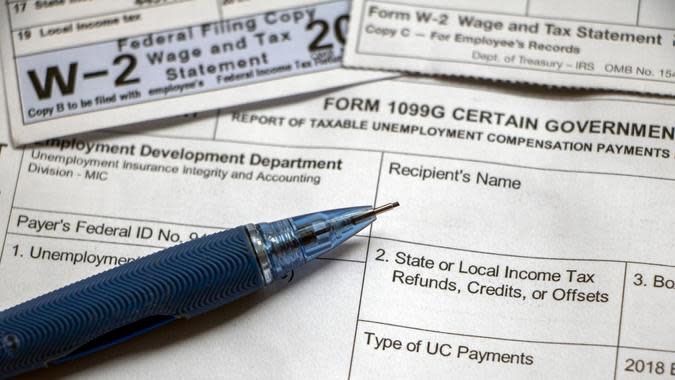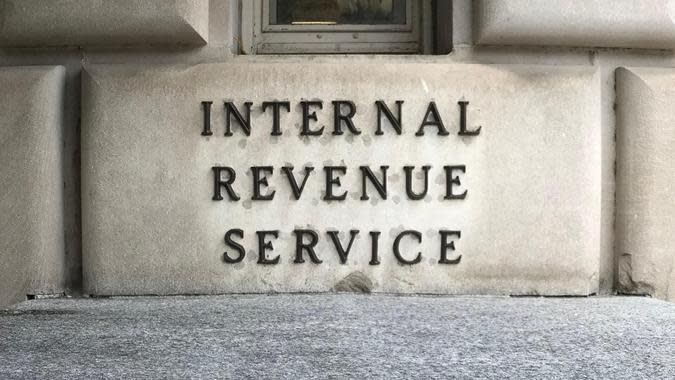Bitcoin and Crypto Taxes in 2022: What You Need To Know

Cryptocurrency is the Wild West of the investment world. Not only are these digital currencies completely nontangible, but they fluctuate with such volatility that trading and investing in them can feel more like playing a video game than investing in a real asset class.
See: Best Undervalued Cryptocurrencies To Buy for 2022
Check Out: 8 Best Cryptocurrencies To Invest In for 2022
But from a tax perspective, the IRS views cryptocurrency transactions the same as if you were buying or selling stocks, bonds or other financial assets. Here are the important tax-related things you need to know about cryptocurrency, whether you trade it or simply use it to buy your morning coffee.

Yes, Cryptocurrency Is Taxable
Let's cut right to the chase -- yes, cryptocurrency can be taxable, depending on what you do with it. The IRS views cryptocurrency as a capital asset, meaning there are taxes to be paid on any gains. But other actions can also trigger tax on cryptocurrencies, and you should be prepared to declare any such transactions when you file your taxes.
Find: Tax Prep 2022: AARP Offers Free Assistance -- What Documents Will You Need To Provide?

Cryptocurrency Is Taxed as a Capital Gain If You Sell It
If you buy crypto and then sell it, from a tax perspective, you'll be taxed the same as if your cryptocurrency was a stock. In other words, you'll pay short-term capital gains tax if you held the security for one year or less, and you'll owe long-term capital gains tax if you held your position for longer than one year. The long-term capital gains tax rate is more favorable for most taxpayers, as it tops out on most transactions at 15%. For single filers with an AGI of $40,400 or less -- or $80,800 or less for joint filers -- the long-term capital gains rate drops to 0%. Short-term capital gains, on the other hand, are taxed at your ordinary income tax rate.
Read: The Best and Worst States for Taxes, Ranked

You'll Owe Tax If You Use Cryptocurrency To Purchase Something Else
Planning to use your crypto to purchase things like your daily latte or some new clothes? You'd better plan on recording the details of that transaction as well because it's likely to be taxable. If you use crypto to purchase goods or services, you're technically converting your crypto into dollars and then using those dollars to make your purchase. In other words, the IRS views purchases with crypto as sales of crypto. If your crypto is worth more than when you bought it, that transaction becomes a taxable gain.
Find Out: Most Popular Things To Do With Your Tax Refund -- and How To Do It Smarter

Mined Crypto Is Taxed as Ordinary Income
If you successfully mine cryptocurrency, you're rewarded with coins or tokens for your efforts. In a sense, you're being paid a financial reward for the work you do for the blockchain. The IRS views these payouts as taxable income, and you'll owe ordinary income tax on the value of what you receive, even if you don't sell it. If you do ultimately sell that cryptocurrency, you might also be subject to capital gains taxes if its value has risen since you received it.
Learn: Taxes 2022: Are Face Masks and Hand Sanitizer Deductible?

Buying Crypto With US Dollars Has No Immediate Tax Consequence
If you simply buy cryptocurrency, you won't have to report that transaction to the government, and there is no taxation involved. Theoretically, you can avoid taxation on your cryptocurrency forever if you simply hold it. You'll only be taxed on your cryptocurrency if you sell or exchange it at a gain in the future.
Did You Know: This Is Where Your Tax Dollars Actually Go

Will My Crypto Exchange Send Me Tax Information?
Since cryptocurrency exchanges are still in their infancy, you shouldn't expect them to provide you with any year-end tax information regarding your crypto holdings or transactions. The same was true in the early days of stock brokerages. But whereas brokerage firms now provide customers with transaction data and gain/loss information regarding their holdings, most crypto exchanges still do not. This may change in the future, but for now, you should take care to record all of your transactions on your own, particularly when it comes to calculating taxable gains or losses.
Related: 7 Ways You're Accidentally Committing Tax Fraud

What Tax Forms Will I Need To File?
Your crypto transactions, including amounts and dates, should be reported on Form 8949. Ultimately, this information will transfer to your Schedule D, where all of your capital gains and losses will appear. Crypto you earned from mining should usually appear on Schedule C if you're running your mining operations as a business. In this case, you'll likely be liable for self-employment tax as well. If you can demonstrate that crypto mining is simply a hobby, you'll report that crypto income on Line 8 of Schedule 1. Obviously, as crypto taxes can get complicated, you'll likely want to consult with a tax advisor for the specific answers regarding your crypto tax filing questions.
See: How To Avoid Paying Taxes Legally -- and the 11 Craziest Ways People Have Done It

Do I Have To Report If I Pay Someone in Cryptocurrency?
Whether you're an employer hiring a salaried worker or a client paying a contractor, you have to declare the payments you make to the IRS. This is true whether you make your payments in U.S. dollars or cryptocurrency. For employees, you'll have to report the income you pay out on a W-2. If you pay a contractor, you'll have to issue a Form 1099.
Keep the Tax Man Away: 30 Ways To Prevent a Tax Audit

Legal Ways To Avoid or Reduce Crypto Taxation
As mentioned above, if you simply hold your crypto until you die, you'll never have to pay anything to the IRS. However, most investors plan on taking profits on their crypto positions at some point. One way to minimize your crypto taxation is to take losses to offset any of your gains. For example, if you own Bitcoin at a $5,000 profit but have a $5,000 loss on your position in PayPal stock, you can sell your stock and use that loss to offset your taxable Bitcoin gain. Another way to reduce your crypto taxes is to hold your positions for longer than one year so you can benefit from lower long-term capital gains tax rates.
More Expert Advice: What Can I Write Off on My Taxes?

Be Aware: The IRS Has Pledged To Crack Down on Crypto Taxation
Through its own admission, the IRS has been uncharacteristically lax when it comes to the enforcement of crypto taxation. However, the agency is approaching the issue with renewed vigor in 2022, so if you've escaped taxation in the past, you shouldn't expect to do so going forward. For starters, taxpayers must now check a box on their 1040 tax forms to indicate if they have engaged in any digital currency transactions during the year, as has been a requirement since 2019. The IRS compares these answers with the knowledge it receives about large crypto transactions on exchanges to help it locate unreported crypto gains. It also uses other enforcement actions that it may not share with the general public. In short, the IRS is aware of the vast amount of unreported crypto profits, so reporting your transactions in compliance with the law is the best way to avoid any type of issues with the IRS.
More From GOBankingRates
Experts: Here's How Much You Should Have In Your Checking Account
Find Out Which Banks Are the Top 100 Banks Leading the US in 2022
40% of Women Have Less Than $100 in Their Savings Accounts, New Survey Finds
This article originally appeared on GOBankingRates.com: Bitcoin and Crypto Taxes in 2022: What You Need To Know

 generic
generic 